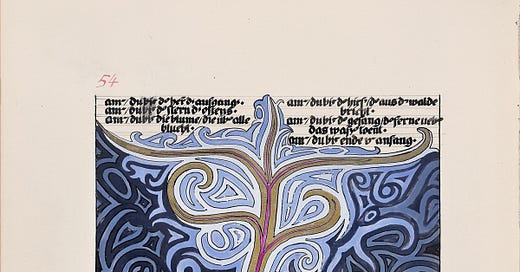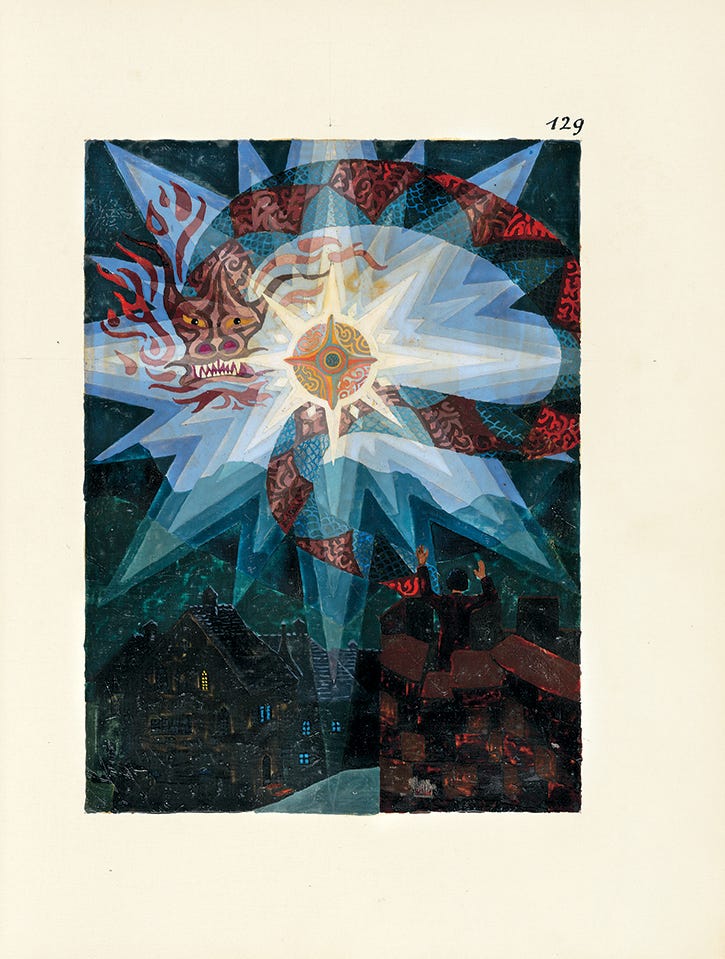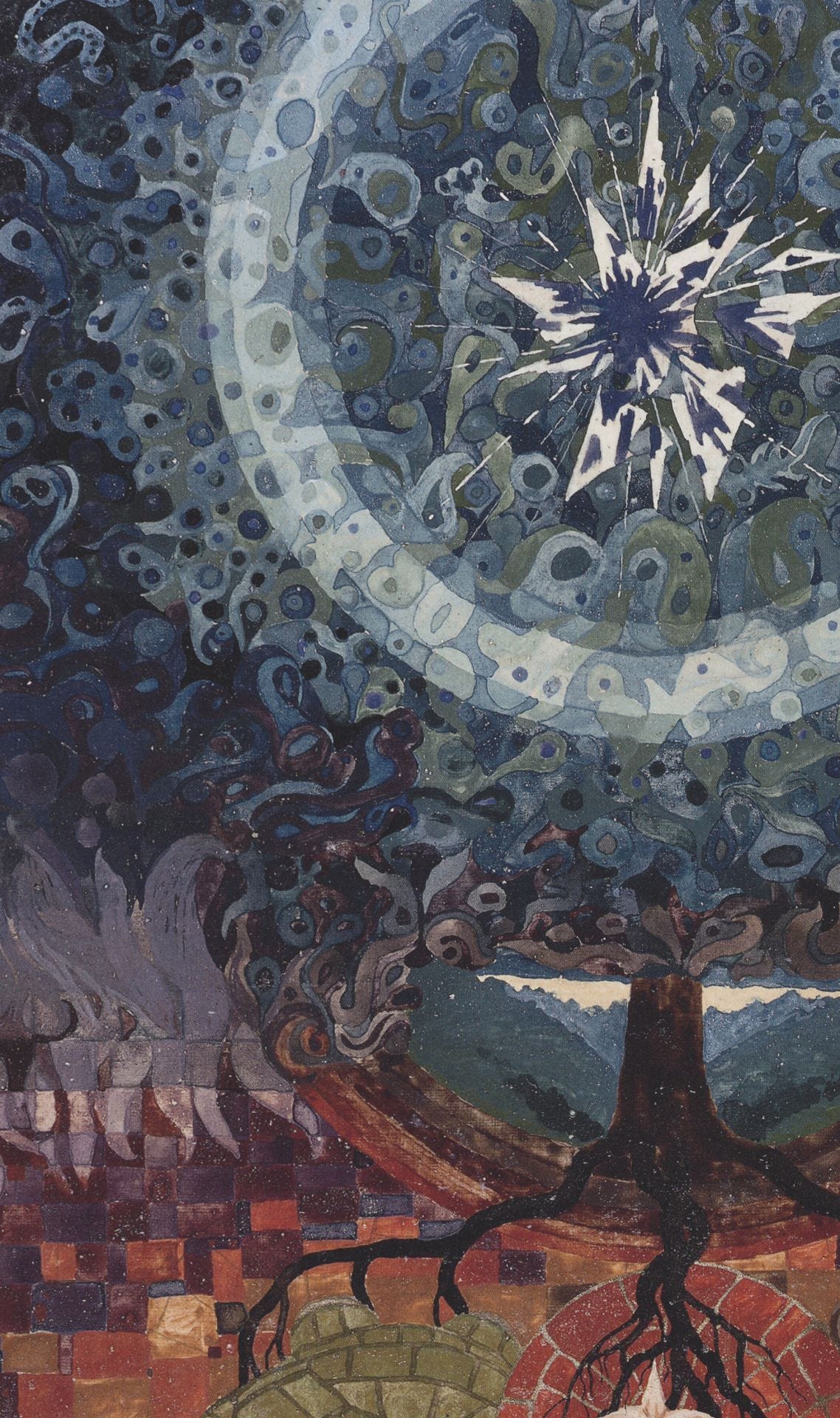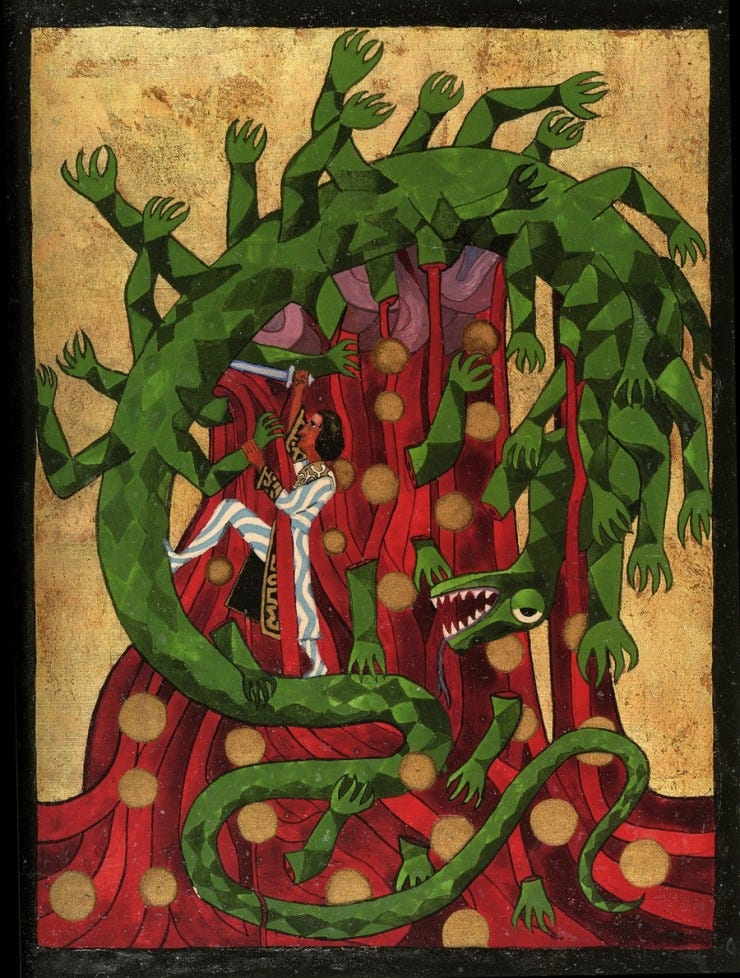The following was written on March 2nd and March 3rd, and was sparked by reading this piece:
It is scheduled to auto-publish on April 7th, my 58th birthday. I will not be “here” (online) to see that, but I will return roughly ten days after that. (The first part of my response is in the comments to the article, and footnoted here.1) I am making it a free birthday post, and because it contains a universal (Catholic!?) message that I feel should be available to everyone.
(All artwork from Jung’s Red Book)
Jung at Heart
First off, I wasn’t able or willing to read the long quotes from Stephen Hoeller, a Gnostic writer, that finish Neo-Feudal’s piece. My attention wandered because I only really wanted to know what NF thought of Carl Jung’s thesis, not what someone else did—too many steps removed—and because it was too analytical and abstract for me to relate to or make sense of.
It also includes stuff about the so-called “Divine Feminine” and about God-Goddess union for Yahweh to become whole, which is all a bit New-Age for me and seems like the wrong direction to take. “Divine Feminine” is a bit of an oxymoron, archetypally speaking at least, where God corresponds with Sun, light, Spirit, and the ineffable formless, and “Goddess” with Earth, matter, and the “darkness” of forms.
After all, these are principles, not principals, much less “persons.”2 And a God that is not whole or is unconscious is not a God so much as a Demiurge; and since Demiurge (as I will argue below) corresponds quite closely with fallen Lucifer and the realm of Matter, then any “Goddess” is a better fit for Satan than God’s mate.
Second off, I was first reading Jung at the age of 21 (The Undiscovered Self, which came up in the recent Alan Watt transcript, by an odd twist of fate), and all through my twenties and into my thirties. (Some of his ideas informed Prisoner of Infinity, though not as many as Freud’s.) More recently, Jung’s close association with Allen Dulles, at the time MKUltra began and UFOs became a matter of national security and mass fascination, combined with his occultic, Gnostic, Aryan cult leader tendencies, have caused me to regard him with a degree of suspicion.
That he was a brilliant thinker is unquestionable. That he got things right, or made good choices based on his insights, is an entirely other matter. That said, Answer to Job is one of my favorite works by Jung, and when I read it again last year for Children of Job, I found it as interesting as ever, even if I was no longer so sold on its Gnostic framework for God.
Unconscious Yahweh
The idea of Yahweh being unconscious, and hence close to synonymous with Yaldabaoth, the Demiurge of the Gnostics, does have its appeal. It also fits rather well with many passages in the Old Testament, or at least a certain reading of those passages.
But do we need—or benefit from—such a literal interpretation, either of the Old Testament or, by extension, of Carl Jung’s Answer to Job?
Both books are fiction, after all. The one is presented as cosmic metaphysical history, the other as psychoanalytical theory; but they are fiction nonetheless, insofar as they are not reporting on “simple,” provable facts. (What is, you may ask; but let’s put that aside for now.)
As NF states, Carl Jung wrote a rant, a very intelligent rant. Answer to Job is one psyche wrestling to get to grips with the God of the book of Job, and by extension, the Old Testament. And just as what Jung is interpreting cannot, in all honesty or good faith, be read as a literal reportage of mundane history, so Jung’s commentary and analysis shouldn’t be read as concrete metaphysics, so much as the collision between one psyche and a text.
Like Job arguing with God, Jung is arguing with the text in which Job argues with God. And then NF is arguing with Jung’s text, and I am arguing with NF’s—all iterations of a cognitive battle with metaphysical truth and the problem of God/evil.
This is—as Guido Preparata has insisted to me on more than one occasion—the only problem truly worth grappling with.
And yet . . .
Is there a difference between the problem of evil, the problem of evil coexisting with an all-good, all-powerful, omnipresent God, and the problem of an all-powerful, all-good, omnipresent God, period?
Like the Holy Trinity, these three are really one problem, and the threefold problem is the problem of Man, i.e., of human consciousness as it wrestles with the infinite within which it is contained, and which it contains within it.
This is the same logical problem of how can Christ be both fully human and fully God—and of how God can be omni-everything, and yet Satan can somehow exist within that omniverse.
All iterations of a common concern.
We Have Half a Mind to Split a Cosmic Hair
NF suggests that Carl Jung’s interpretation of God as unconscious doesn’t work as well as the Gnostic idea of a Demiurge. He then acknowledges that this may be a bit of hair split. I agree.
God having an unconscious, or shadow side, corresponds closely enough with the Gnostic notion of a Demiurge split off from God that forgets its true source and mistakes itself for God.
It also fits with a Lucifer, the brightest angel, who brings the light when God says “Let it be!” and so brings the material universe into existence but then recoils from being subject to that materiality, stuck beneath God and on a par with Man, who then traumatically dissociates and forgets himself as God’s No. 1, and becomes “the Satan,” forever pointing the finger at Man’s inferior status and “original sin.”
Yes, that was all one sentence.
But now back to Yahweh-as-unconscious.
I prefer to interpret it thus: Yahweh was the story of God (“In the beginning”) which the chosen people, the Israelites, told themselves, by embodying it in their tribal activities. This was the first step towards collective monotheism—as opposed to the Egyptian Pharaoh kind—as One God within which all humankind, starting with that chosen tribe, gets to be His people.
In that first stage, there was a split (again) because the chosen people were largely unconscious, primitive, tribal-minded. Their groupthink could never embody God as a single image, which God (being one Himself) must eventually manifest as—albeit eventually as Every Man.
Jesus Christ came to fulfill the law of the prophets: by being the first Man to embody God fully, in an individual body, rather than in a tribal collective groupthink-tank kind of body.
Ergo, Yahweh is unconscious—because the Jews were unconscious. They lacked individuation, and their perception-manifestation of God acted accordingly.3
Uplink to Eternity
Evil is the side effect of this unconsciousness. It is when God lives in a mob.
Scapegoating is what binds the group together, hence it becomes the (sacred) law of the land. The ruler of this Kingdom is the Satan—that which accuses (scapegoats).
Christ ends all that, but only by dying. And so it is for each of us.
The problem of evil co-existing with God is solved thus, through God dying on Satan’s cross, thereby ascending it, on Earth as it is in Heaven.
God and evil cannot both exist, because an all-good, all-wise, all-present God leaves no possibility for evil to exist. So either evil exists, or God exists. It cannot be both.
The experience of both existing is that of the fallen nöös, or Satanic Man, which is a “free-will” chrysalis for Christ-Man to be born out of.
To crack the Satan-shell requires dying to this life, to be reborn to the next. It requires the smallest thing there is, the mustard seed of faith that provides an uplink to eternity.
Yet, insofar as we will, at some point, make a connection to eternity, within eternity, then we always will and always have. Hence, we are already linked.
This must be personally experienced, however. It is here, and only here, that we can reconcile God with evil, as follows:
If I look at my own life, I do not see the existence of evil. It is only when I look out at the world and its stories that I perceive evil as real. In my own life, all the bad, the terrible, the painful, the horrific, the enraging, the appalling, the regrettable, the tragic things that have happened or that I have done, they have all, in some sense, led to good.
All have deepened my sense of goodness and of God.
This is true, strangely and paradoxically, even of those things (like psychedelics, occultism, or personal acts of cruelty) that have distanced me from goodness, at the time—because even through distance, by contrast, awareness of the good is deepened.4
Horror and the Human Heart
“Deep in my heart, there’s a house that can hold—just about all of you.” —Marc Bolan, “Spaceball Ricochet”
This capacity for seeing the brighter side is encapsulated in the phrase, “It could be worse.” The meaning of this phrase is not merely that explicitly stated—that there are always greater evils that might have befallen us—but, implicitly, that we can still glimpse some goodness or mercy in our circumstances, no matter how bleak they look to us.5
Evil should not be made an abstract quantity, for to do so gives it a mystical power that it lacks. Our only reliable reference point for evil—for how bad it gets—must be direct experience, including our direct experience of other people’s direct experiences.
The question as to what is the worst thing that has ever happened to someone we know personally is the only accurate yardstick we have for the evil that God allows; because direct experience is the sole context for our consciousness regarding said evil, and hence for our capacity to make sense of it.
In other words, the greater our experience of apparent evil is, the more our consciousness must adapt to that experience, and find a place for “evil.”
This is Job’s lesson from God, with the Satan as the author of it.
When I tried to think of the most horrific things I have personally suffered, my mind went to a beloved cat killed violently (by a car, say, or dogs); but I quickly realized that this hasn’t actually happened to me, at least not to cats I had a strong bond with. (It has almost happened, and I thought it had happened once, and that it might have happened countless times.)
My mind then went to my older (only) brother, who died in 2010 of a heroin overdose at 47. He died in sordid and tragic circumstances that may even have included foul play (or at the very least, gross negligence). Objectively speaking, evil was involved in his death, and certainly sinfulness.
But subjectively speaking, even at the time, my experience was of a heart (mine) forced to expand beyond its limits, to encompass the pain, horror, and anguish, and make a place for it.
By doing so, the horror was reduced—by being contained—and my heart’s capacity was increased.
So where is the evil in that?6
God’s Response to Man’s Evil
God is not “the concept by which we measure our pain” (John Lennon, “God”). God is the reality through which we transform our suffering into grace.
In my life, I can say that only God exists, is real, and therefore, that no evil exists. Evil exists “out there,” in the world; but only insofar as the world “out there” is fundamentally unreal.
A skeptic might counter that there is even less evidence for God in our lives than for evil, if concrete objects and events are the means by which we measure it. I would respond that the evidence for God in my own life is more in the nature of a space than anything that fills that space.
It is precisely the capacity to “hold a space” for unbearable suffering, loss, horror, and despair—for apparent “evil”—that makes the vastness of that space known to me.
The greater evils of the world, and the lesser evils of my own life, then become the dark background by which God is made visible to me: as that within me that is undaunted and undiminished by even the very worst of experiences.
Evil does not come from God, exactly; but evil arises in our minds when confronted with aspects of reality (which is God) that are more than we can bear or comprehend.
Only when we place our faith, trust, and certainty in that within us that can bear the reality of “evil,” do we realize the presence of God, both in our lives (in the world) and in ourselves.
One might therefore say that mind—when configured in defense against and defiance of reality—is the root of all evil.
Approached theoretically and conceptually, within a mental framework, the problem of evil is indeed irreconcilable with the existence of God. But perhaps this tells us less about the solubility of the problem than it does about the suitability of philosophical reasoning to solve it?
Only the soul can solve the problem of evil, and only the body (which includes the intellect) can act as an instrument by which the solution is uncovered.
Satan’s kingdom of shadows has no foothold in eternity, because it cannot withstand contact with the light. This means that no soul is permanently damned for its sins, ever.
No soul is eternally cast into oblivion, much less eternal suffering, because it is only that little sentience given to sin—as to a parasite that feeds on life—that gives it a brief semblance of reality, a reality that is withdrawn at the end of (our) days, when the ghost of evils past returns to unreality.
Evil, to the soul, is like a tick feeding on a shepherd’s dog is to the Sun. The Sun lives also in the shepherd, and in his dog, as the original life-force energy of their existence. It even lives in the tick.
It is the one thing that is continuous to all of these aspects of existence, so it is the only thing that is truly, everlastingly real.
This is God’s answer to Job: “Rejoice, for all your suffering increases My glory, and therefore yours too.
“As does, in fact, your defiance!”
In fact—in mystic texts at least, and in psychological analyses—the very struggle against God is the surest sign that God is alive and well in the soul of Job.
And that of Jung.7
Free articles happen because of paid subscribers. My goal is to get to 200 and stay there, after which all written content will be free. I am not seeking endless expansion, only remunerative stability. There is 20% off for multiple submissions. Contact me for details.
I began the Children of Job substack with an exploration of the book of Job and the Tanakh, the Old Testament, with particular reference to Jack Miles’ God (which I recommend). His interpretation of the book of Job echoes Carl Jung from fifty years earlier, with Answer to Job, a book I first read in my twenties. Mission crept over the ensuing months, until I wound up writing a lot more about standard sociocultural engineering operating procedures, the Jew Question, World War 2, and even taking an unprecedented (non-voluntary) dive into Trumponomics. Early on, I came on NeoFeudal’s site, and his writing on international bankers had an influence on my understanding of the JQ, and we argued (a bit) over DJT & movies. Now it’s a few days before Lent, during which I plan to take an Internet sabbatical, and I have six weeks’ worth of posts scheduled to air in my absence. None of them were about Job (until now), but I have been wondering if, when (or if?) I return, I will finally get back to the God stuff. Then, out of the blue, NF writes a piece about the book of Job. Evidently, Substack abhors a vacuum! Reading the piece, I felt my response getting longer & longer, the more I read. Now it’s 3,000 words and a full article queued up behind all the other posts that won’t be online until near the end of Lent (sorry); but it may herald the return to the God-stuff I was hoping for! Time is not what it seems to be. Watch this space. :)
I still haven’t managed to get to grips with the Christian notion of a personal God, outside of Christ that is, who has a personality because he has a body.
This does speak to “the JQ” and the problem of Jewish identity as a transnational, trans-ethnic, trans-religious kind of modern-day tribalism and groupthink: both how it continues to exert a pernicious influence and how it get scapegoated for doing so (and, most confounding of all, how the groupthink of “anti-Semitism” that scapegoats “the Jews” thereby reinforces the Jewish identity and its hold over the collective. Identity is a jealous God.
At the same time, for a better and more realistic picture of “the world”—human society and its history—the element of active evil, or organized malevolence, is essential. For without it, even the most probing intellects (as I explored with the French philosopher Rene Girard) risk becoming unwitting instruments of illegitimate powers of “darkness,” peddling versions of history that are, not merely fictions, but intentional deceptions—cover-ups. Think of books on the 1960s that completely ignore or obscure hidden social engineering machinations of the CIA, MI6, CFR and Fabian Society, for example; or a history of serial killers and assassinations in the US that omits mention of the Phoenix Program or CIA’s MKULTRA as the driving forces. One might even say (I would) that the obscuring of evil, when describing the world, is the only real evil: since ignor-ance of these unpalatable and sinister aspects of (social) reality is both a symptom of and a cause for the proliferation of evil.
Perhaps, you might argue, we wouldn’t want to use these four words of reassurance (“It could be worse”) to Roman Polanski on the morning of August 9th, 1969; or to a “Holocaust” survivor who has lost his entire family; and so on. Yet in both these cases, we do not know the truth of what happened, because the reports handed down to us have been so distorted that they are, to some degree, untrue.
I should probably add that I also suffered the “evil” of chronic fatigue and body pains for over two decades of my life, on a daily basis, with the corresponding misery and despair. Certainly, at the time, I felt I was under attack by malevolent forces, nor do I renounce that interpetation now I am mostly through it. But I also felt that I was undergoing some sort of “purgatorial processing” that allowed for a refinement of my consciousness, and a relinquishing of unhealthy fixations, attachments, and identifications.
What we take for Man struggling to comprehend God and evil, is it really God getting to grips with (being) Man—and the corresponding (damned) problem of free will?











An interestingly entangled and, in some aspects, graceful round of wrestling (e.g. the description of God being evidenced in one's life by a space). It is difficult to get any grip on these matters by use of language, but by the same token it can be worthwhile trying to communicate about them. I am not sure about all the ideas, but that matters little.
"Identity is a jealous god": this is a fine encapsulation of much that is troublesome, both ancient and modern. (See also "mind—when configured in defense against and defiance of reality—is the root of all evil").
The "purgatorial processing" is a fitting description for my own experiences, which are similar to those described in the footnote.
Regarding our responses to tragedies and losses, of course (?) that which you describe in respect of your brother's passing is not the only possibility - one could also react in an embittered, hardened, even vengeful way. I guess that, even in the case of such reactions, the 'good' is still there somewhere in that God's allowing us free will to respond as we do is a loving act, as it would not be loving if our responses were dictated or determined.
(And if God's love has bestowed free will upon human beings, might He also have bestowed it upon spiritual entities also? - this would allow for the notion of evil being at large in the cosmos as a force/forces).
I trust it was a happy birthday.
Thank you and happy birthday! Evil lives within a mob. That rings true to me when I consider the social engineering of the past few years. When it boils down to it, you can't hide the evil that was done to people in the name of 'The New Normal' and 'Build Back Better' and other advertising slogans like 'Safe and Effective'. What to do about it is a daily question that people like yourself help me answer.